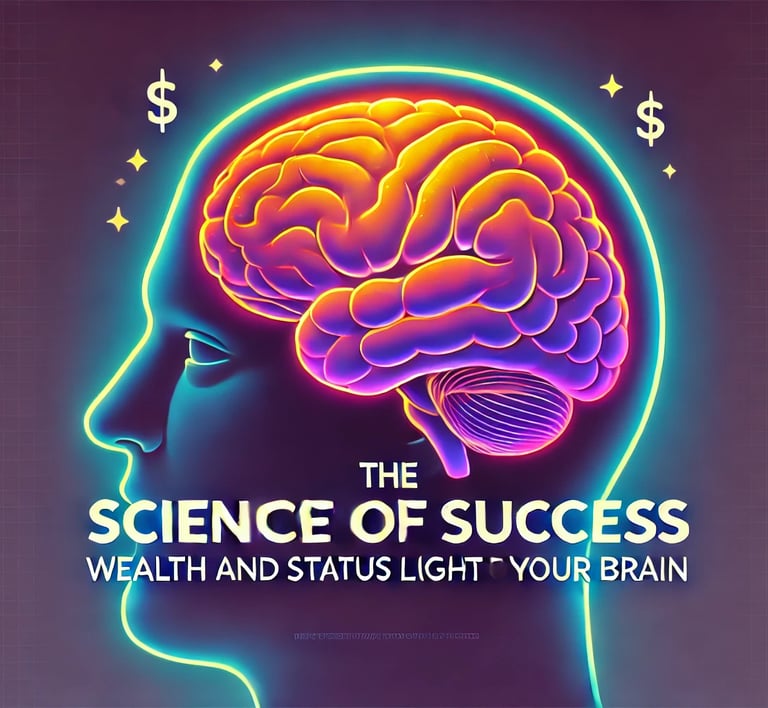The Wealth Code: How Money and Status Shape Our Success
Did you know your brain values both wealth and reputation equally? The latest research shows that our reward centers light up for both, meaning money and social standing are powerful forces in our pursuit of success. Discover how understanding this can transform your career, leveraging social approval alongside financial gains to build a richer life. This approach combines philanthropy, ethical wealth-building, and social impact for a balanced path to achievement. Learn the science of motivation and fulfillment, making each step towards success both meaningful and rewarding. Dive into how you can master both wealth and status for true happiness.
PERSONAL FINANCE
10/31/20245 min read


The Science of Success: Why Reputation and Wealth Are Twin Pillars of Fulfillment
In the game of life, we're all climbing, chasing the dual prizes of wealth and reputation, two powerful motivators that light up our brains and fuel our daily drive. Whether it’s the thrill of a promotion or the applause of social recognition, our brains don’t just like these rewards—they crave them. And the reason we find both money and status so satisfying is written in the very code of our minds.
The Brain’s Currency Exchange: Money and Status
Imagine your brain as a stock exchange where two assets—cash and status—are constantly trading. At the heart of this exchange lies the striatum, our brain's "reward center." The striatum doesn't differentiate between types of rewards: both a cash bonus and a public compliment trigger similar levels of excitement. From an evolutionary perspective, these rewards are valuable because they once signaled survival and success. Money ensured access to resources, while social approval meant higher status within the group. Now, this drive remains coded deep in the folds of our brains.
Status: The Crown Jewel of Motivation
Interestingly, new research in Neuron suggests that social status might hold an even greater sway over our minds than money. Imagine getting a pat on the back for a job well done versus receiving a small cash bonus. You might assume the cash is more valuable, but scientists discovered that our brains respond with even more excitement to positive social feedback than to money. When people receive praise, the striatum lights up like a jackpot on a slot machine.
This could be why many people choose high-status careers, work late nights, and chase the next big thing. The desire for status taps into a deep-seated need to belong, to be respected, and to be admired. It’s what fuels ambitious dreams and lifelong aspirations, pushing us to seek approval from others. As Mark Twain famously said, "I can live for two months on a good compliment," illustrating the staying power of positive social feedback.
Games and the Science of Social Climbing
To better understand this drive for status, researchers created a simple experiment. Participants competed in games against "fake" opponents. When they outperformed these imaginary rivals, brain scans showed a surge of activity in the striatum, especially when they knew they were climbing above someone else. Even though these games didn’t directly affect their earnings, participants’ brains reacted more to status comparisons than to money. It’s as if our brains are built to respond to "social climbing" just as they are to financial gain.
In today’s world, we don’t have to go far to feel the effects of this: think of social media, where likes and followers are the new currency. When we post something that gains traction, we feel a rush, even though it doesn't pay the bills. That’s the striatum at work, soaking up the satisfaction of social validation.
The Pain of Public Failure
However, status isn’t always a source of joy; it can be a source of deep anxiety. The same studies revealed that when people failed at tasks and imagined their "inferior" competitors succeeding, brain areas associated with emotional pain, like the anterior cingulate cortex, lit up. Essentially, social failure triggers the same kind of pain as physical injury. This response likely evolved to protect us from the dangers of exclusion. In a tight-knit group, being seen as a weak link or a liability could mean social rejection, which in the distant past was synonymous with survival risk.
The fear of social judgment is deeply tied to our mental health. This is why public speaking is one of the most common phobias. The thought of making a mistake in front of an audience triggers not only embarrassment but also a threat to our perceived status. For many, this fear of failure can hold them back from growth opportunities, reinforcing the connection between social perception and mental well-being.
The Ultimate Balance: Wealth and Status
The good news? Balancing both status and wealth is achievable, and the reward is profound. Building wealth and social status isn’t about choosing one over the other; it’s about combining them in ways that benefit both our sense of self and our place in the world. This is where purpose-driven wealth comes in: using money not just to accumulate, but to uplift.
Take the example of philanthropists like Andrew Carnegie, who famously said, “The man who dies rich, dies disgraced.” Carnegie understood that true wealth includes social contributions, not just bank accounts. When we use our resources to help others—donating, mentoring, volunteering—we experience a unique kind of satisfaction. It’s not just about writing a check; it’s about building a legacy that enhances our reputation and strengthens our social standing. It’s what philosopher Adam Smith referred to as "moral sentiments," a recognition that our well-being is tied to the prosperity of others.
The Code in the Striatum
This unique combination of status and wealth, contributing to society while building personal wealth, is almost like hacking the brain's reward system. It gives our striatum a double dose of satisfaction, as philanthropy elevates our social standing while providing financial security. It's a win-win scenario that fuels mental well-being, keeps stress at bay, and gives us peace of mind.
When we seek both financial success and social value, we’re aligning with the brain's natural wiring. Instead of merely chasing the next bonus or the next round of applause, we’re creating a foundation of long-term happiness. This approach can even alleviate the societal pressures that often lead to stress and anxiety. If we understand that both money and status are simply reflections of a deeper need for security and social acceptance, we can navigate life's social and financial landscapes with greater awareness and intention.
Rewiring the Way We Pursue Happiness
In a society that often tells us to "get ahead" at all costs, understanding how our brain processes rewards can empower us to pursue a different path. The research on the striatum suggests that what we truly crave isn’t the money or status themselves but the sense of fulfillment and respect they bring. When we align our pursuits with our values—seeking wealth ethically, contributing positively to our community, and valuing relationships over rivalry—we tap into the deepest layers of satisfaction.
This isn’t just wishful thinking; it’s neuroscience. The brain's reward system responds best when we seek meaningful accomplishments, grounded in both personal growth and collective good. It’s about climbing not for the sake of standing atop the hill alone but lifting others as we rise. When we do, we’re rewarded with something money can’t buy and status alone can’t sustain: peace of mind.
The Bottom Line: Wealth and Status as Twin Pillars
To live a truly balanced life, pursuing both social approval and wealth in moral ways is key. It’s about knowing that while money provides security, status brings satisfaction. Together, they form the twin pillars of fulfillment. Like a well-balanced portfolio, blending these pursuits makes us resilient and adaptable to life’s changes.
So, the next time you find yourself celebrating a raise or a compliment, remember that it’s your brain’s way of rewarding you for reaching a milestone. But remember, the ultimate reward comes from combining the two in ways that serve not just ourselves but the broader community. By living this balanced code, we create a life that’s rich in every sense, fulfilling our brain’s deepest drives and giving us the legacy of true happiness.
About the Author :
Dr. Abush, MD, MBA – Physician, Global Stock Trader, and Author
Dr. Abush is a distinguished MD/MBA with expertise in both medicine and the global financial markets. With a keen analytical approach honed through medical and business training, he navigates stock markets worldwide, focusing on strategic trading and economic trends. As an author, he shares insights on market psychology, financial strategies, and mindful investing, blending financial growth with ethical considerations. Dr. Abush is dedicated to advancing financial literacy and empowering others to navigate markets with confidence and clarity.


